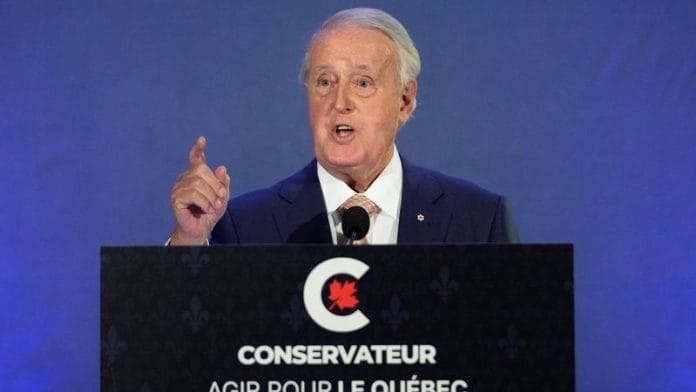Ottawa: Brian Mulroney, the former Canadian prime minister who struck a free trade deal with the U.S. but whose legacy was marred by revelations of improper business dealings with an arms dealer, has died.
Mulroney died peacefully surrounded by family, his daughter Caroline Mulroney posted on social media platform X on Thursday. He was 84.
Mulroney had a heart procedure in August and was treated for prostate cancer earlier last year, she said in a social media post in late August 2023.
A corporate lawyer turned businessman, Mulroney led the center-right Progressive Conservatives to a historic win in 1984 over the Liberals of Pierre Trudeau.
A skilled politician with a gift for public speaking, Mulroney sought to emulate in Canada the conservative leanings of the Ronald Reagan and Margaret Thatcher era by revamping the tax system and selling off government assets.
His nine-year stewardship was marked by negotiations for the Canada-United States Free Trade Agreement in 1988, which helped boost Canadian exports, and the introduction of a goods and services tax in 1991. The tax was enormously unpopular politically but helped fix the government’s finances.
Under Mulroney, some government-run corporations were sold off, including Air Canada.
Mulroney took an active interest in foreign affairs, pushing through a treaty with the United States to curb acid rain, spearheading efforts to tackle the 1984 Ethiopian famine and speaking out against apartheid in South Africa.
“You cannot name a Canadian prime minister who has done as many significant things as I did, because there are none,” the author Peter Newman quoted him as saying in an interview.
Mulroney was born on March 20, 1939. He and his wife Mila had four children.
A tall man with a broad smile and booming voice, Mulroney was known for his charm, which University of Toronto history professor Robert Bothwell described as “a unique characteristic that was extremely effective”.
Mulroney formed a close bond with Reagan, the U.S. president at the time, and the two men marked a 1985 summit with a public rendition of the song “When Irish Eyes Are Smiling”.
Mulroney’s ties to Reagan helped him negotiate a landmark treaty to end acid rain and the bilateral trade deal with the United States, by far Canada’s biggest trading partner.
“It’s quite clear that Reagan was prepared to go out of his way to oblige his friend Brian,” Bothwell said in an interview. “I do think that on relations with the United States, he deserves immense credit.”
Mulroney also presided over two failed bids to change Canada’s constitution to grant the predominantly French-speaking province of Quebec the status of a distinct society.
The efforts, designed to thwart the Quebec independence movement, fostered deep cleavages between French and English Canada that reverberated politically for decades.
Mulroney won large majorities in 1984 and 1988, in part by bringing together social conservatives in the west of Canada and nationalist voters in Quebec.
But strains began to emerge and the union fell apart in the late 1980s and early 1990s with the creation of the overtly separatist Bloc Quebecois and the western-based Reform Party.
He resigned in 1993 amid record low popularity numbers. The Progressive Conservative party was reduced to just two of 295 seats in the House of Commons in an election later that year – easily the biggest defeat in Canadian history – and never recovered politically.
After leaving politics, Mulroney returned to law and became a partner with the Montréal firm Norton Rose Fulbright.
In 1995, a leaked letter revealed that Royal Canadian Mounted Police had accused Mulroney of having taken kickbacks from German-Canadian arms dealer Karlheinz Schreiber on the sale of Airbus airliners to Air Canada in 1988. Mulroney sued the Liberal government and won an apology and damages in 1997.
But in 2010, an inquiry into the affair concluded Mulroney had indeed had inappropriate business dealings with Schreiber. Mulroney told the inquiry there was nothing illegal about the payments, but apologized publicly for taking the money.
“My second biggest mistake in life, for which I have no one to blame but myself, is having accepted payments in cash from Karlheinz Schreiber,” he said in 2007. “My biggest mistake in life — by far — was ever agreeing to be introduced to Karlheinz Schreiber in the first place.”
A close friend of both Reagan and former U.S. President George H. W. Bush, he delivered eulogies at the funerals of both men.
(Writing by David Ljunggren and Deepa Babington; Editing by Daniel Wallis)
Disclaimer: This report is auto generated from the Reuters news service. ThePrint holds no responsibilty for its content.






